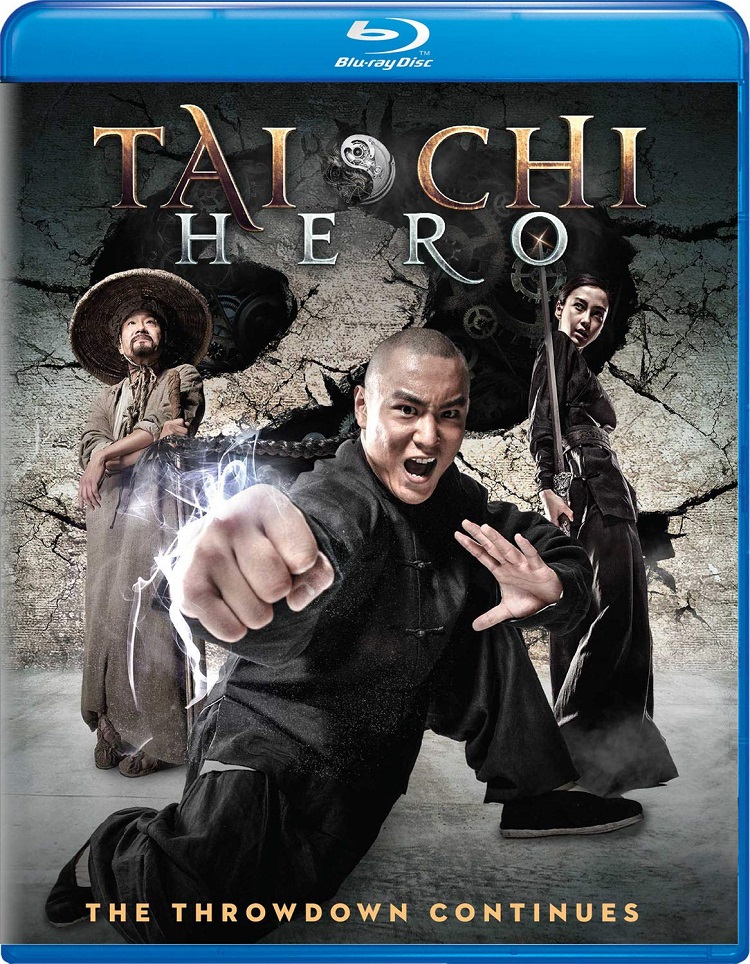
I almost made a big mistake going into watching Stephen Fung’s Tai Chi Hero — I nearly disregarded the prequel, Tai Chi Zero, assuming this was just loosely or not-at-all related. It’s important to note that, similar to Kill Bill, these are two parts of one story, or one movie broken into two (possibly more) parts, if you prefer (his IMDB page seems to confirm, but it’s in its developmental infancy at best). The brief recap at the beginning of Hero is not nearly enough to bring you up to speed, or convey what was so entertaining about the first half of this story. See Tai Chi Zero, then come back. It’s currently on Netflix streaming. I’ll wait.
Ok, done? Cool. Wasn’t that movie fun? Hero picks up right where Zero left off, with the stranger (Feng Shaofeng) outside Chen village insisting he be granted entry. While his identity is quickly revealed, his motives are not, and it’s a while before we fully understand what those are or his path to redemption that follows. Not going to spoil that one for you.
Yuan Xiaochao returns as Yang Lu Chan, arriving fashionably late for his own wedding that tied up the events of Zero, but his bride Chen Yu Niang (Angelababy) is anything but blushing. She quickly realizes this marriage is entirely one-sided, a requirement for Lu Chan not to be crippled at the end of the first movie for “stealing” Chen style kung fu. She quickly establishes that they are not husband and wife, but rather student and master, respectively. Gradually his dumb charm wears her down and she sees his value in the greater scope of unfolding events, and while they never quite tumble down a hill together in a vomitously cliche romantic scene (thanks, Star Wars prequels), together they grow into the bigger roles they must fulfill both within their family and as protectors of Chen village as a whole.
Eddie Peng is back as villain Fang Zi Jing, hell bent on destroying Chen village and everyone in it. Apparently losing one leg of his love triangle (Claire) in the first movie has completely turned him off to the other (Yu Niang), not to mention that she married the idiot who thwarted his steam-powered goliath. Zi Jing is emboldened by the presence of British railroad tycoon Duke Fleming, played by the unexpected but amusing Peter Stormare. Fleming brings the big guns (literally), and provides formidable opposition to Chen village. There’s a chase and a fight scene and a weird steampunk glider and someone gets captured and it’s up to our heroes to save the day. Oh my!
Zero took its time establishing the characters and what they stood for, having lots of fun with it along the way. Hero seems to take a more serious tack, with fewer goofy pop-up graphics to tell us who plays which characters and why that’s awesome. The sequence of very Scott Pilgrim-esque fighting scenes returns, but in more brief and less entertaining fashion. It really felt kindof shoved in there as if to tell the audience “Remember when we did this before and it was funny? Remember? REMEMBER?” Sammo Hung’s well directed acrobatics and wire-fu are equally impressive as in the first movie (especially for returning Master Chen Chang Xing played once more by Tony Leung Ka Fai), but everything else feels rushed in a way, particularly the third act, where one anti-climactic fight greases the wheels for everything to get neatly wrapped up with a bow on it in a matter of minutes, and explained via narration and montage rather than action or adventure. No big showdown between the hero and the bad guy — Lu Chan just has to prove he knows Chen style kung fu by some completely arbitrary measure, then the Prince uses his political influence to magically fix everything in a snap.
Something largely absent from this part of the story is the evolution of Lu Chan’s “Three Blossoms of the Crown” birthmark which, when struck, sends him into a furious rage that can conquer all comers. Improved self-discipline gradually heals him of the darkening protrusion, eliminating it from the story entirely. That was his ace in the hole, his secret sauce, the one thing the audience always wanted to see more of, and they killed it, quietly, and never spoke of it again. I think of Superman II, where Supes opts to sacrifice his great power to have a life of love with a mortal. There’s no trade-off here other than restoration of health. If he can be cured like that, why not keep it in a neutral state where he can still tap into the crazy super power once in a while? It’s not for us to reason why.
As the credits rolled on the rather abrupt and somewhat unsatisfying ending, I hoped for a last-second cliffhanger or a gratuitous teaser for a third movie, the way they used the credits for Zero to introduce Hero, but nothing of the sort happened. No trick second ending, either. Nothing. As mentioned earlier, there are rumors of a third movie, Summit, but no idea when that’s due to release, and nothing was really left open at the end of Hero to warrant it.
Tai Chi Hero is still a good flick, especially for genre fans — by which I mean not-too-serious martial arts movies with Scott Pilgrim influences. The dialogue and subtitles move faster than Lu Chan’s fists at times, but you won’t be lost if you miss a line here and there. Yes, it’s good…I just thought Zero was slightly better. Still, being “not quite as good as Tai Chi Zero” puts it above 90% of the other chop-socky flicks out there, though. The comedy works though it’s more sparse, the non-lethal combat is fun to watch, and the characters are as enjoyable as ever.